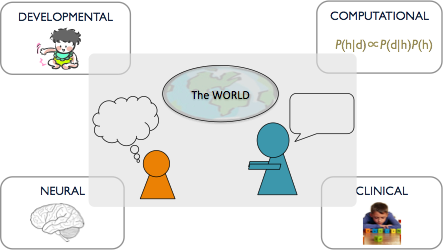About Our Research
We know far more than what we can directly experience. We learn about the world by drawing rich, abstract inductive inferences that go beyond what we can observe, and much of these observations come from behaviors of others around us. By engaging in social learning in diverse contexts, humans learn from others, share their knowledge with others, and even accumulate a body of cultural knowledge over generations.
But how?
The Social Learning Lab (SLL) aims to understand the cognitive mechanisms that underlie the communicative interactions we experience in our lives. In particular, the ways in which young children learn from others provide a unique window to the interface between our ability to draw powerful inferences and to our understanding of others’ thoughts and actions (Theory of Mind).

More recently, with some of our colleagues, we have argued that humans interpret others' actions through the lens of a naïve utility calculus, assuming that agents act in ways that maximize their expected utilities. The naïve utility calculus extends the traditional Theory of Mind, suggesting that our understanding of other minds incorporates not only their mental states but also the expected costs and rewards of their actions. Some of our recent research shows how these representations inferential processes influence the ways in which we learn from others and help others learn, both in the minds of the learners (e.g., what should I learn from whom?) and in the minds of the teachers (e.g., what and how should I teach?).
Currently we are extending our understanding of social learning to study a broader range of human behaviors. We employ a wide range of methods---behavioral experiments, computational models, fMRI---with human subjects of all ages (from infants to adults). Using diverse approaches, we hope to study a full description of the cognitive mechanisms that support powerful, effective, and distinctively human social learning.
Here's a talk by Hyo that summarizes some of our work & ideas, at a recent CogSci workshop.
About Our Values
Social Learning as a way of life
We consider social learning not just as a topic for scientific research but also as a way of life. Although we come from different places and backgrounds, with different experiences, ideas, and questions, we respect these differences and delight in finding similarities in what we value as scientists (and also in what we enjoy as our favorite hobbies, music, and movies! See our work on rare preference effect). We take joy in learning from each other and helping others learn, and we are proud to consider this community as our intellectual home where we learn not only about the world (our science), but also about others (our community) and about who we are (personal and professional development).
Inclusion and diversity
We are dedicated to making our lab a warm, safe, inclusive, and supportive place for all. If you are excited about understanding the human mind and how we understand and interact with others, our door is open! We stand firmly against all forms of discrimination in our everyday scientific and intellectual practices, and we welcome people of all colors, genders, ages, ethnicities, nationalities, and cultural backgrounds.
Scientific rigor and transparency
We are committed to holding ourselves against the highest standards in the quality of our intellectual pursuit, scientific rigor, as well as transparency and openness in our everyday scientific practices. To this end, we strive to keep ourselves up to date on relevant knowledge and technical expertise.
Warmth, openness, and compassion
While pursuing a career in science presents various difficulties and uncertainties, we believe that having a warm, supportive community can keep us happy, motivated, and forward-looking even as we grapple with some of the hardest problems in science, as well as the failed experiments and rejected publications that life in academia throws at us. We also value openness and compassion in how we communicate with and understand each other. We understand from our own research that the ways in which we interpret others’ behaviors depend on how we represent their intentions; yet our mental states are unobservable and can often be misrepresented or misunderstood. By approaching every conversation assuming the best intentions, and being open in our communication, we believe that our lab can be a warm, welcoming environment for all.